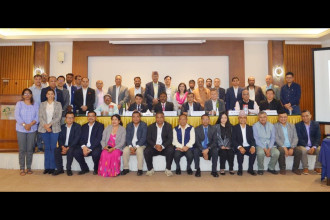-1714106816.jpg)
KATHMANDU: Prime Minister Pushpa Kamal Dahal has stated that the 16th periodic plan will concentrate on integrated infrastructure development and the expansion and use of information technology.
In his address at the inaugural session of the National Development Council's meeting today, the Prime Minister emphasised that the 16th Plan will prioritise agricultural commercialisation, the promotion of product-based industries, employment-oriented education, and quality healthcare services. He suggested that high priority should be given to the promotion of tourism, the creation of domestic job opportunities, and the development of integrated settlements. To meet this need, the periodic plan is expected to focus on fostering innovation and entrepreneurship through youth-targeted domestic and foreign investment, according to the head of government.
PM Dahal stated that the government recognises private sector as a key player in economic prosperity. He added that the plan endorses the facilitating roles of the government, community, non-government organisations, and development partners in efforts to achieve economic prosperity. He expressed optimism that the plan will accurately define its visions, goals, and investment estimates.
He insisted on the need for collaborative efforts among the three-tier government to successfully implement the plan, stating that it is necessary for governments at all levels to mobilise revenue concisely to manage investment and public expenditures.
"The plan anticipates securing a significant investment from the private sector," said Dahal, expressing hope that the goals, objectives, and strategies of the plan will contribute to seeking an effective role of the private sector in economic expansion through the promotion of investment, production, productivity, and employment.
He stressed the need for a regular and result-oriented monitoring and evaluation system during the implementation of the plan. He also expressed hope that the National Planning Commission (NPC) will develop an integrated framework for economic reforms and implement it in coordination with all relevant bodies. "I hope the goal for average economic growth and other social and environmental goals of the plan will be achieved by an effective implementation of the plan through collaborative approaches among all, including the three-tier government, private sector, cooperatives, and development partners."
Similarly, Chairperson of CPN (Unified Socialist) and former Prime Minister Madhav Kumar Nepal underscored the need to prioritise agriculture in the 16th Plan, suggesting that forest and mining-based industries should be established and policy-level errors should be rectified.
"The government should proceed with confidence in the private sector and adopt a policy of encouraging the private sector," he added. Noting that the development of the hydropower and tourism sectors would make a significant contribution to the country, Chair Nepal stressed that the government should focus its attention on these sectors.
Likewise, Vice-Chairperson of the Rastriya Swatantra Party and Minister for Labour, Employment and Social Security, Dol Prasad Aryal, highlighted the need for all political parties, bureaucracy, and the general public to work together to maintain good governance.
"The country has to rely on imports due to legal complexities, despite having the necessary means and resources for its development and prosperity," he said, adding that existing laws should be revised to utilise available means and resources.
Chairperson of the Janata Samajbadi Party Nepal, Deputy Prime Minister, and Minister for Health and Population, Upendra Yadav, emphasised that the 16th Plan should be advanced with a focus on strengthening federalism. "The country cannot prosper until the provinces are made resourceful. The concept of planned development should be advanced for the country's development," he stressed.
Ranjita Shrestha, Chairperson of Nagarik Unmukti Party and former Minister, stated that the national economy should be strengthened by maintaining good governance and establishing social justice in health, education, employment, and other sectors. She opined, "The working capacity should be maximised by strengthening the interrelation of all three levels to achieve the goals and objectives of the 16th Plan. It is necessary for all political parties to be responsible and united with a common goal for the country's prosperity."
Former Finance Minister Prakash Sharan Mahat emphasised the need to move forward by selecting prioritised projects in the country's economic development, stressing the need to pay special attention to project selection and budget allocation.
Similarly, former Finance Minister Yubraj Khatiwada suggested adopting a policy of achieving more results from low investment, adding that the country's economy has been improving in the recent period.
NPC Vice-Chairman Min Bahadur Shrestha shared that the NPC should be restructured and made stronger legally, expressing the view that it would be easier to implement the strategy and action plan of the 16th Plan only if the NPC becomes strong.
Parliamentary party leaders of the political parties represented in the Federal Parliament, Deputy Prime Ministers, ministers, Chief Ministers, Chairpersons of Federal Parliamentary Committees, and national security advisors were present on the occasion.




-1745481452.jpeg)

